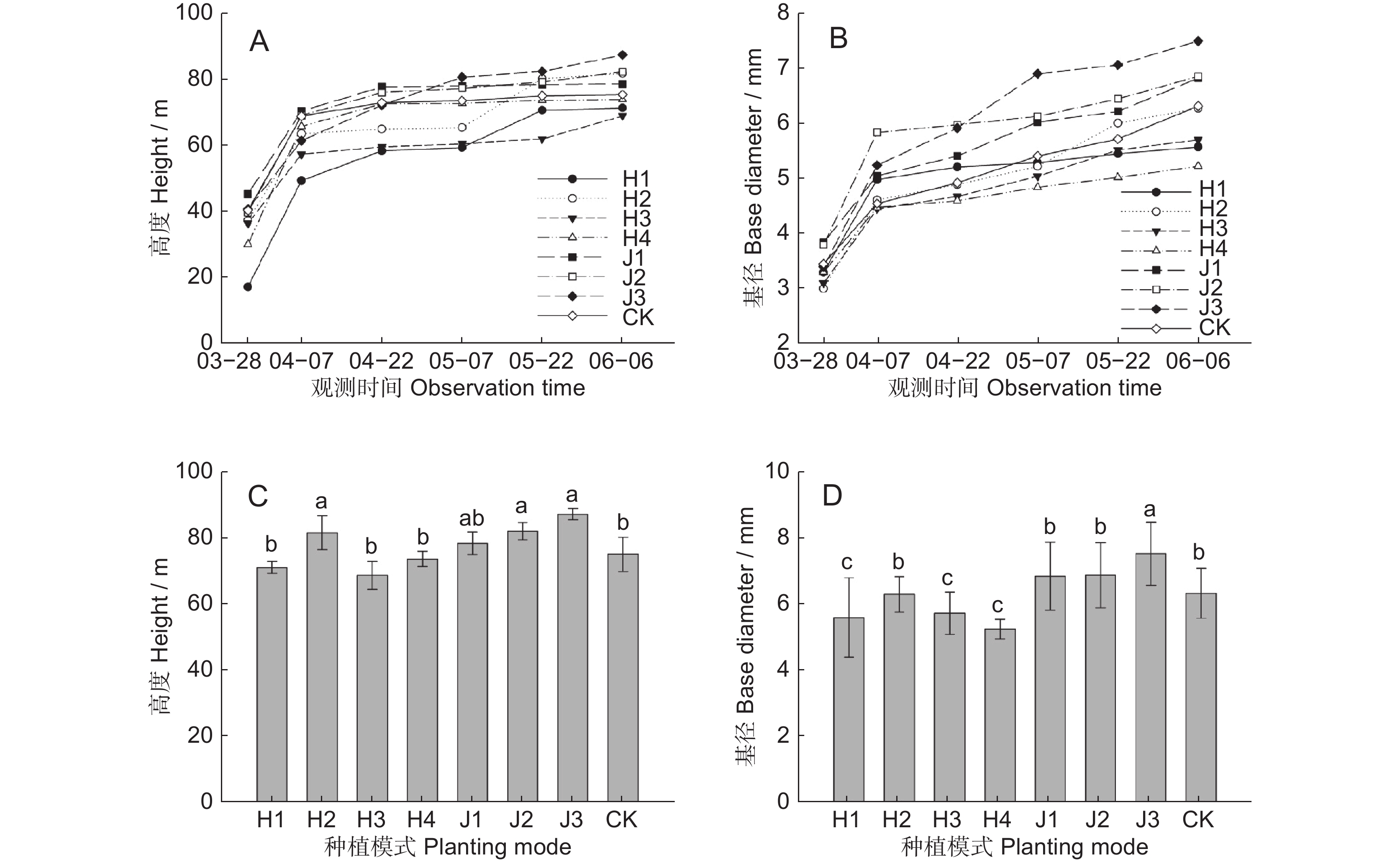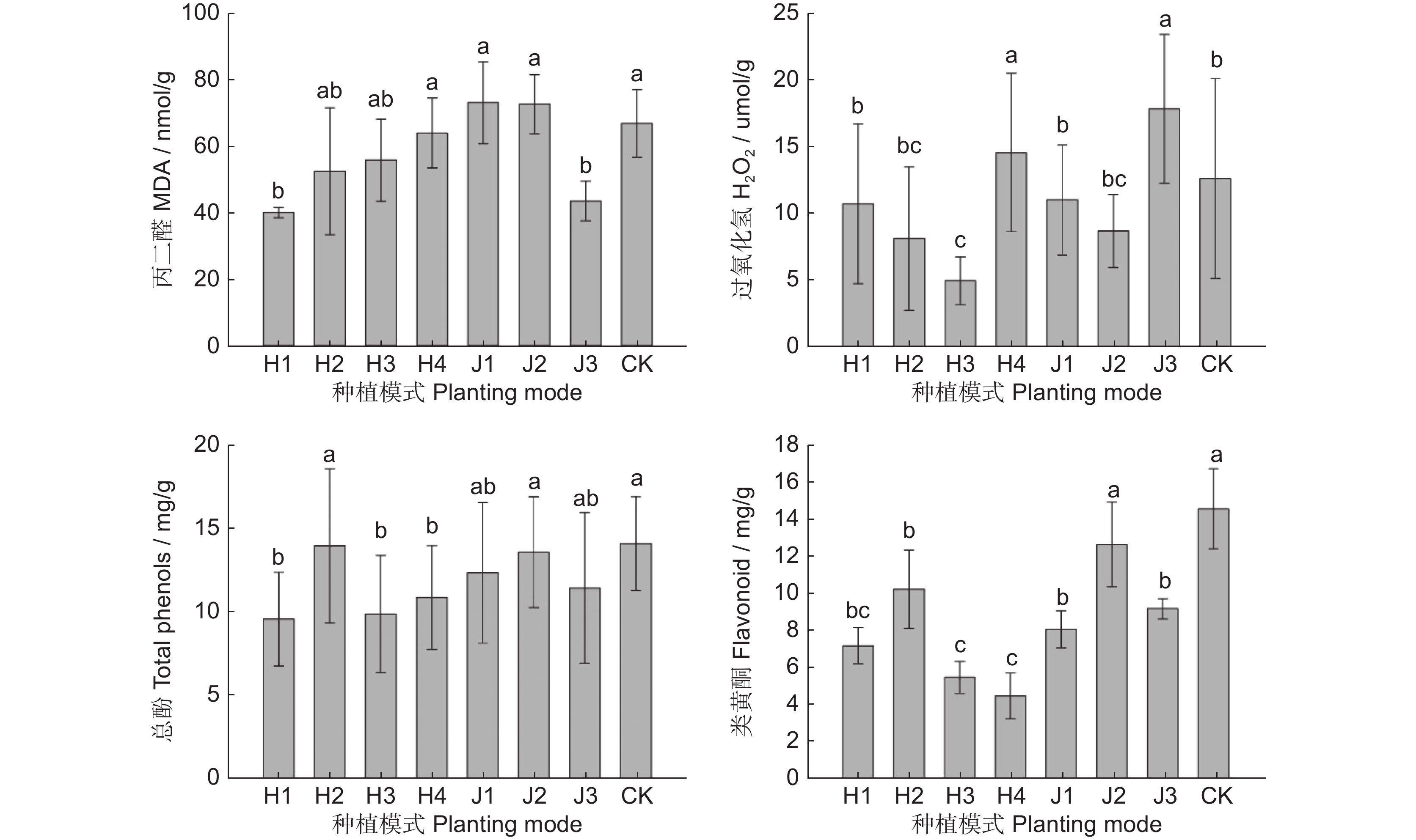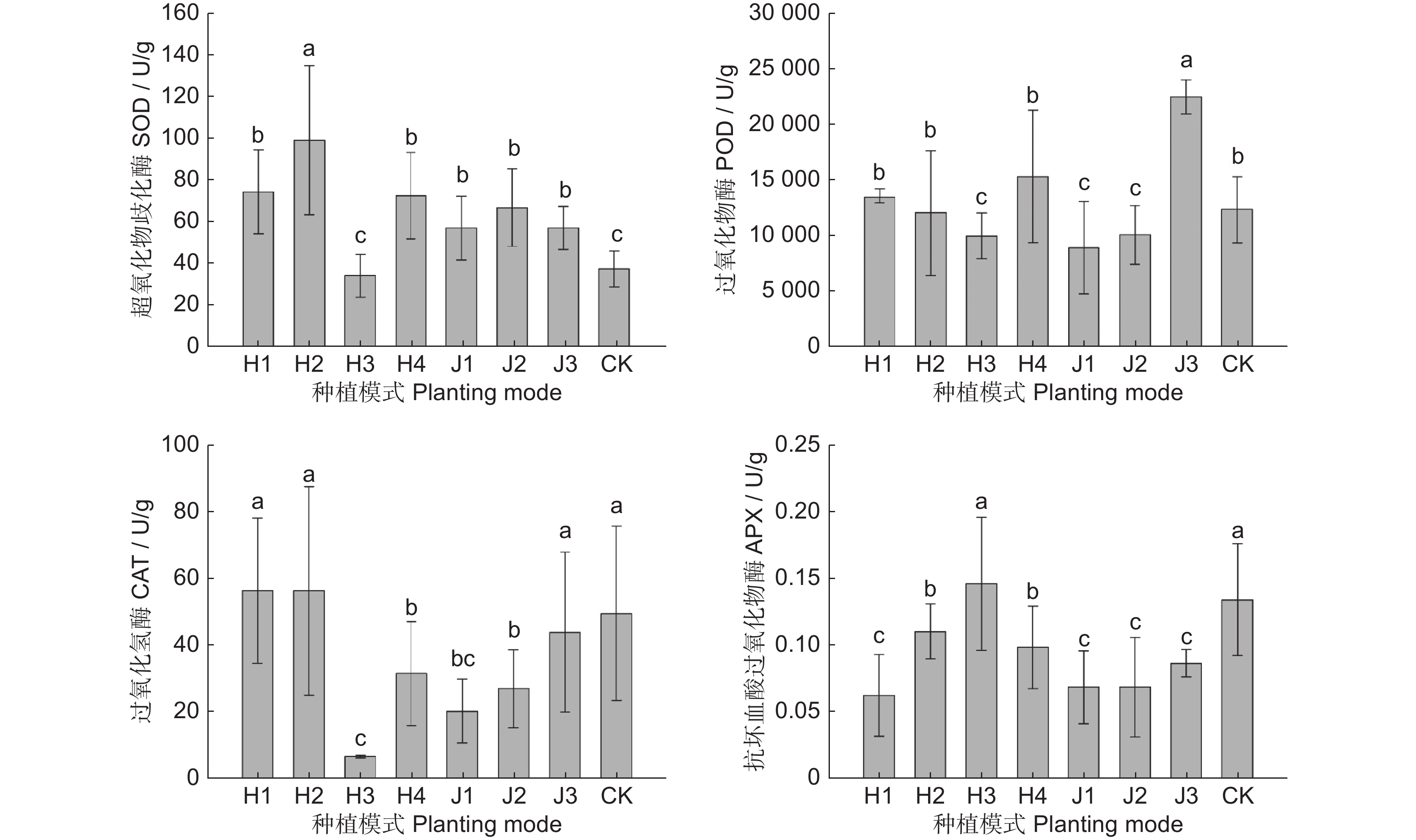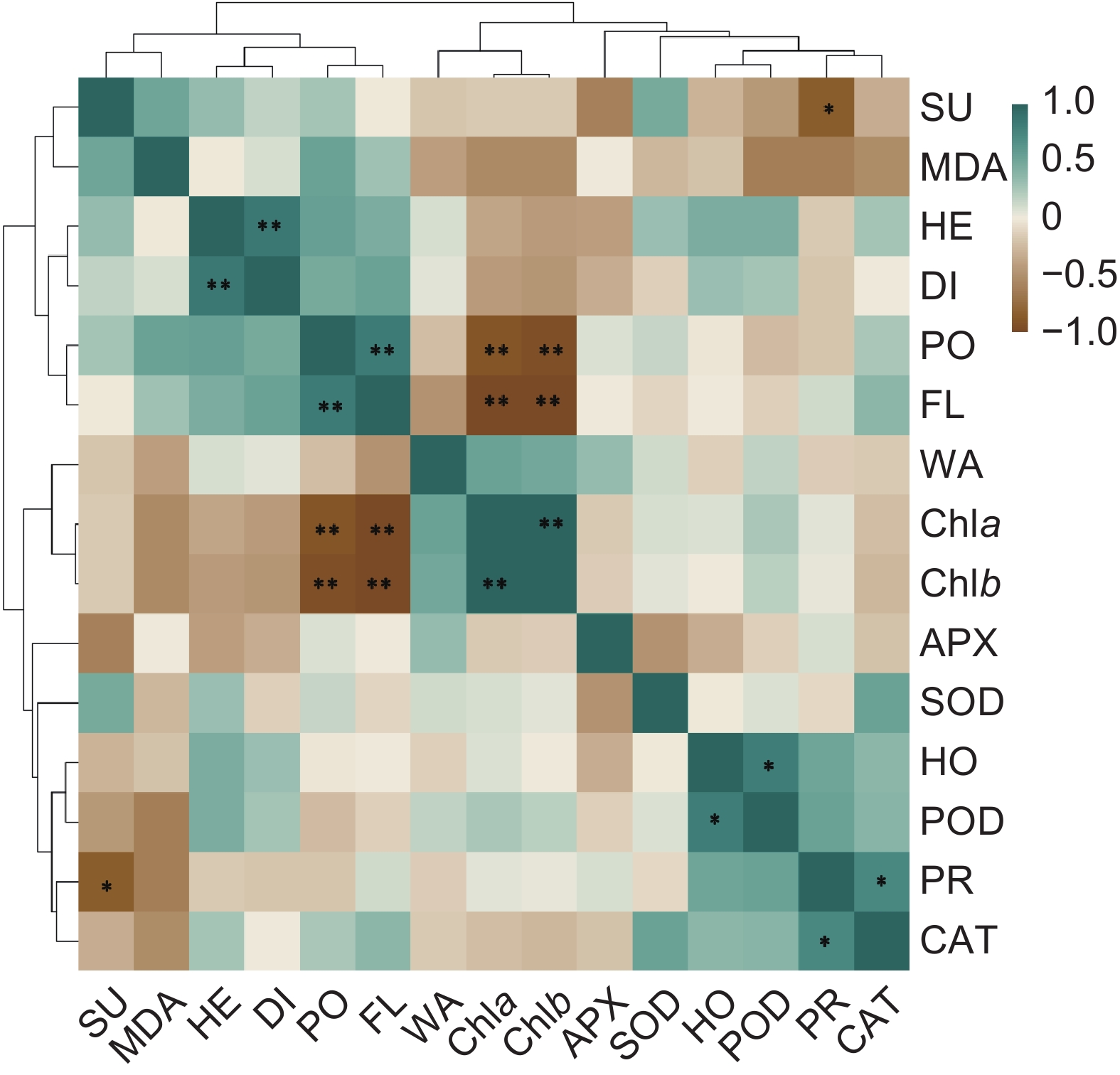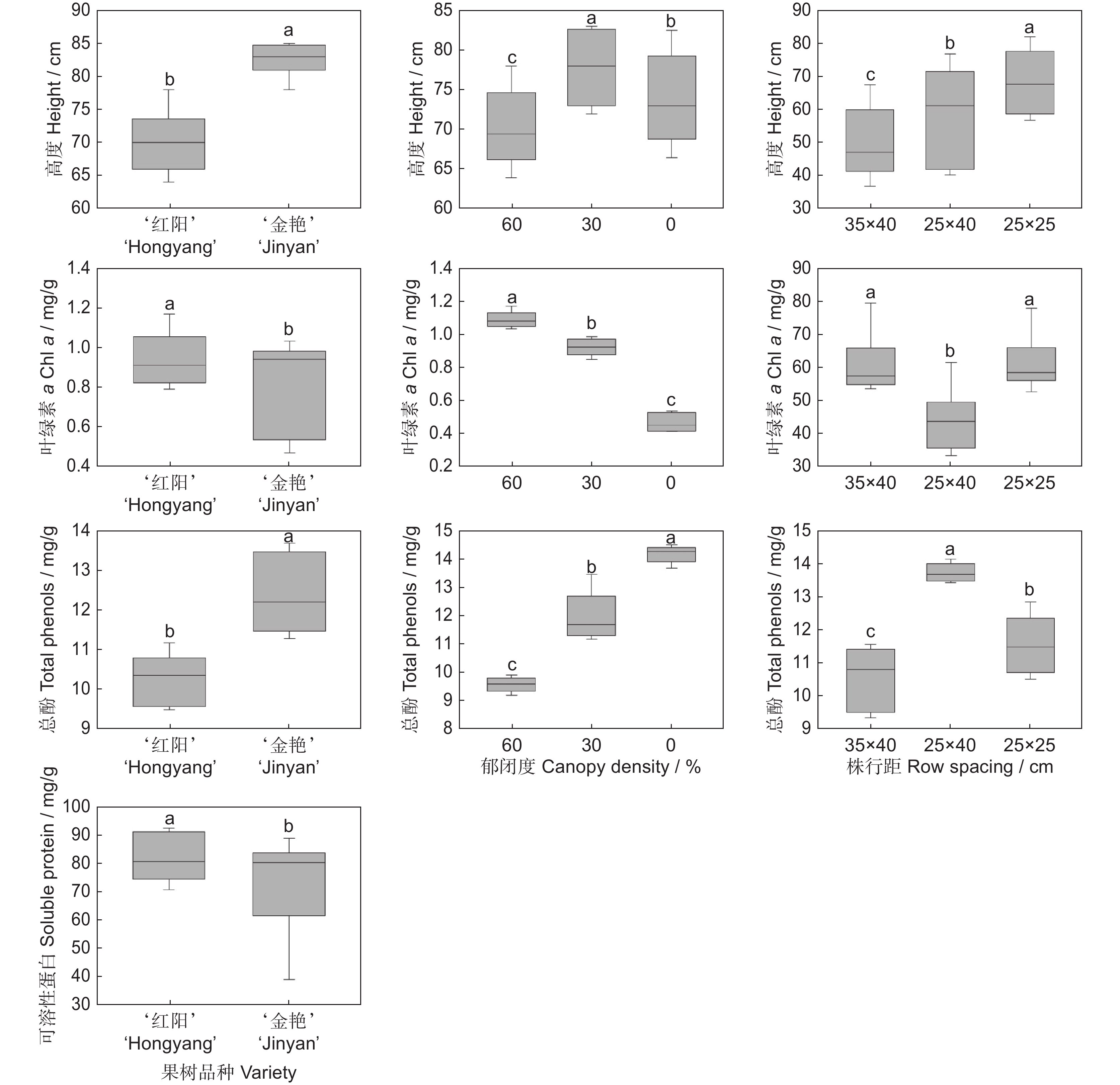Construction and evaluation of Polygonatum cyrtonema Hua intercropping based on the growth and physiological adaptability
-
摘要:
多花黄精(Polygonatum cyrtonema Hua)多采用林下仿野生种植,猕猴桃(Actinidia chinensis Planch.)果园林下环境与森林接近,具备复合种植的潜在可行性。本研究通过设置不同猕猴桃品种(‘红阳’、‘金艳’)、郁闭度(60%、30%、全光照)和种植密度(株行距25 cm×25 cm、25 cm×40 cm、35 cm×40 cm),分析对多花黄精生长的影响,以筛选适宜的种植模式。结果显示:‘金艳’果园中,多花黄精植株高度较高,基径较粗;60%郁闭度果园中,多花黄精叶片叶绿素含量较高,丙二醛(MDA)含量和抗坏血酸过氧化物酶(APX)活性较低;30%郁闭度果园中,植株高度较高;而全光照条件下,叶片相对含水量较低,可溶性蛋白、脯氨酸、MDA、总酚、类黄酮含量较高,过氧化氢酶(CAT)和APX活性较高;低等密度模式中叶片MDA和总酚含量较低,而高等密度中叶片MDA含量较高。综合而言,猕猴桃果园复合种植多花黄精是可行的,且适宜的种植模式为郁闭度30%~60%、种植株行距(25~35) cm×40 cm。
Abstract:Polygonatum cyrtonema Hua is typically cultivated under forest conditions that mimic its natural habitat. The understory environment of Actinidia chinensis Planch. orchards shares similar ecological characteristics with forests, suggesting the potential feasibility of intercropping P. cyrtonema within A. chinensis orchards. However, optimizing an appropriate planting model and creating a suitable growth environment for P. cyrtonema requires experimental validation. This study assessed the growth and physiological adaptability of P. cyrtonema under different intercropping conditions by varying A. chinensis cultivars (‘Hongyang’ and ‘Jinyan’), canopy densities (60%, 30%, and full sunlight), and planting densities (row spacing of 25 cm×25 cm, 25 cm×40 cm, and 35 cm×40 cm). Results demonstrated that P. cyrtonema exhibited greater plant height and basal diameter in orchards planted with A. chinensis cv. Jinyan. Under 60% canopy density, chlorophyll content was elevated, while malondialdehyde (MDA) content and ascorbate peroxidase (APX) activity were lower. A 30% canopy density promoted greater plant height. In full sunlight, leaves had reduced relative water content but exhibited increased soluble protein, proline, MDA, total phenol, and flavonoid concentrations, along with higher catalase (CAT) and APX activity. Lower planting densities resulted in reduced MDA and total phenol concentrations in leaves, whereas higher planting densities were associated with increased MDA content. These findings indicate that intercropping P. cyrtonema within A. chinensis orchards is feasible. Optimal planting conditions were a canopy density of 30%–60% and a row spacing of (25–35) cm×40 cm.
-
-
图 2 不同模式中多花黄精植株高度和基径生长变化
A:多花黄精生长期高度;B:生长期基径;C:6月上旬高度;D:6月上旬基径。不同小写字母表示差异显著(P<0.05),下同。
Figure 2. Changes in height and basal diameter of Polygonatum cyrtonema under different modes
A: Plant height during P. cyrtonema growth period; B: Basal diameter during growth period; C: Height in early June; D: Basal diameter in early June. Different lowercase letters indicate significant differences (P<0.05). Same below.
图 5 多花黄精生长生理指标相关性热图
SU:可溶性糖;MDA:丙二醛;HE:植株高度;DI:植株基径;PO:总酚;FL:类黄酮;WA:相对含水量;Chla:叶绿素a;Chlb:叶绿素b;APX:抗坏血酸过氧化物酶;SOD:超氧化物歧化酶;HO:过氧化氢;POD:过氧化物酶;PR:脯氨酸;CAT:过氧化氢酶。*:P<0.05;**:P<0.01。
Figure 5. Correlation heatmap of Polygonatum cyrtonema growth and physiological indices
SU: Soluble sugar; MDA: Malondialdehyde; HE: Height; DI: Basal diameter; PO: Total phenols; FL: Flavonoid; WA: Relative water content; Chla: Chlorophyll a; Chlb: Chlorophyll b; APX: Ascorbate peroxidase; SOD: Superoxide dismutase; HO: H2O2; POD: Peroxidase; PR: Proline; CAT: Catalase.
表 1 猕猴桃-多花黄精复合种植模式设置
Table 1 Setup of Actinidia chinensis and Polygonatum cyrtonema intercropping system
编号
Number果树品种
Variety郁闭度
Canopy density / %光照强度
Light Intensity / lux光量子通量密度
Photon flux density / µmol·m2·s株行距
Row spacing / cmH1 ‘红阳’ 60 30 875±3 450 702±307 25×40(中密度) H2 ‘红阳’ 30 60 788±3 319 1 133±305 25×40(中密度) H3 ‘红阳’ 30 35×40(低密度) H4 ‘红阳’ 30 25×25(高密度) J1 ‘金艳’ 30 59 246±2 136 1 111±288 25×25(高密度) J2 ‘金艳’ 30 25×40(中密度) J3 ‘金艳’ 30 35×40(低密度) CK − 0 84 206±5 032 1 470±330 25×40(中密度) 注:‘金艳’盛果期果园树势较强,郁闭度一般在70%以上,林下光照条件不适宜多花黄精生长,因而只选择了幼龄果园作为研究对象。 Notes: During the peak fruit-bearing period, trees in the ‘Jinyan’ orchard exhibited strong growth, with a canopy density generally exceeding 70%. Understory light conditions were unsuitable for P. cyrtonema growth; therefore, only young orchards were selected for this study. 表 2 不同模式中多花黄精叶片含水率、叶绿素及渗透调剂物质含量
Table 2 Water, chlorophyll, and osmotic compound content in Polygonatum cyrtonema leaves in different modes
模式
Mode相对含水量
Relative water content / %叶绿素a
Chlorophyll a / mg/g叶绿素b
Chlorophyll b / mg/g可溶性糖
Soluble sugar / mg/g可溶性蛋白
Soluble protein / mg/g脯氨酸
Proline / μg/gH1 85.27±1.78b 1.09±0.07a 0.54±0.04a 26.02±6.52c 96.55±9.69a 267.00±69.80b H2 91.30±2.30a 0.79±0.03ab 0.38±0.02b 41.15±7.80b 80.75±23.01b 345.50±19.78a H3 90.54±5.69a 1.06±0.29a 0.53±0.20a 23.15±5.36c 75.05±4.48b 279.61±41.34b H4 87.01±4.74ab 1.08±0.25a 0.52±0.14a 38.16±3.28b 82.74±9.36b 284.05±20.30b J1 88.64±5.70ab 0.96±0.02a 0.46±0.02a 48.80±9.32b 73.38±15.94b 276.70±49.31b J2 82.99±6.92b 0.52±0.05b 0.26±0.02c 61.91±14.11a 67.53±24.85b 231.40±21.63c J3 89.87±3.48a 0.97±0.07a 0.46±0.06a 22.99±6.23c 90.36±14.72ab 246.62±25.63c CK 84.36±5.06b 0.46±0.07b 0.23±0.03c 12.07±3.32d 96.63±10.74a 315.93±42.11a 注:同列不同小写字母表示差异显著,P<0.05。 Note: Different lowercase letters in the same column indicate significant differences, P<0.05. 表 3 多花黄精生长生理指标主成分分析
Table 3 Principal component analysis of Polygonatum cyrtonema growth and physiological indices
指标 Index PC1 PC2 PC3 方差百分比 / % 33.256 24.301 17.026 高度 0.559 0.502 0.548 基径 0.580 0.343 0.337 相对含水量 −0.459 0.023 0.227 叶绿素a −0.934 −0.008 0.328 叶绿素b −0.952 −0.063 0.283 可溶性糖 0.398 −0.464 0.761 可溶性蛋白 −0.252 0.766 −0.510 H2O2 −0.010 0.771 0.147 MDA 0.603 −0.613 −0.003 总酚 0.923 0.064 −0.041 类黄酮 0.901 0.249 −0.294 SOD 0.035 0.229 0.620 APX −0.108 −0.191 −0.735 POD −0.251 0.850 0.139 CAT 0.151 0.789 −0.089 表 4 不同模式对多花黄精生长生理适应性影响的多因素方差分析
Table 4 Multivariate analysis of variance on effects of different modes on Polygonatum cyrtonema growth and physiological adaptability
组合因子
Factors高度
Height叶绿素a
Chlorophyll a可溶性蛋白
Soluble protein丙二醛
MDA总酚
Total phenols过氧化物酶
POD果树品种 0.003** 0.030* 0.010* 0.303 0.010* 0.499 果园郁闭度 0.041* 0.022* 0.745 0.178 0.008** 0.707 多花黄精种植密度 0.132 0.005** 0.231 0.026* 0.005** 0.115 品种×郁闭度 − − 0.642 − − − 品种×密度 0.054 0.491 − 0.055 0.087 0.426 郁闭度×密度 − − 0.256 − − − 品种×郁闭度×密度 − − − − − − Notes: *, P<0.05; **, P<0.01. -
[1] 罗敏,章文伟,邓才富,谭秋生,罗川,罗舜. 药用植物多花黄精研究进展[J]. 时珍国医国药,2016,27(6):1467−1469. Luo M,Zhang WW,Deng CF,Tan QS,Luo C,Luo S. Advances in studies of medicinal crop Polygonatum cyrtonema Hua[J]. Lishizhen Medicine and Materia Medica Research,2016,27(6):1467−1469.
[2] 陈炬烽,钟起尧,郭志鹏,林燕华. 人工生态种植对土壤理化性质、多花黄精产量及品质的影响[J]. 中药材,2023,46(7):1613−1616. [3] 万修福,杨野,康传志,王升,王铁霖,等. 林草中药材生态种植现状分析及展望[J]. 中国现代中药,2021,23(8):1311−1318. Wan XF,Yang Y,Kang CZ,Wang S,Wang TL,et al. Current situation and future perspectives of ecological planting of Chinese medicinal plants in forests and grasslands[J]. Mod Chin Med,2021,23(8):1311−1318.
[4] Brooker RW,Bennett AE,Cong WF,Daniell TJ,George TS,et al. Improving intercropping:a synthesis of research in agronomy,plant physiology and ecology[J]. New Phytol,2015,206(1):107−117. doi: 10.1111/nph.13132
[5] 刘跃钧,蒋燕锋,葛永金,姚理武,谢建秋,等. 锥栗-多花黄精不同复合经营模式经济生态效益评价[J]. 经济林研究,2020,38(4):72−81. Liu YJ,Jiang YF,Ge YJ,Yao LW,Xie JQ,et al. Economic and ecological benefits evaluation of different compound management modes of Castanea henryi and Polygonatum cyrtonema[J]. Non-Wood Forest Research,2020,38(4):72−81.
[6] 黄云鹏,范繁荣,王邦富,沈琼桃,陈绍煌,等. 4种不同林分类型对多花黄精生长的影响[J]. 西部林业科学,2016,45(5):132−135. Huang YP,Fan FR,Wang BF,Shen QT,Chen SH,et al. The influence of four different forest types on the growth of Polygonatum cyrtonema Hua[J]. Journal of West China Forestry Science,2016,45(5):132−135.
[7] 卢玉鹏,高柱,张小丽,陈璐,王小玲. 果园生态系统复合经营的开展模式及生态机制综述[J]. 中国果树,2021(12):9−15. Lu YP,Gao Z,Zhang XL,Chen L,Wang XL. Review on the development model and ecological mechanism of compound management of orchard ecosystem[J]. China Fruits,2021(12):9−15.
[8] Wang YJ,Liu L,Luo Y,Awasthi MK,Yang JF,et al. Mulching practices alter the bacterial-fungal community and network in favor of soil quality in a semiarid orchard system[J]. Sci Total Environ,2020,725:138527. doi: 10.1016/j.scitotenv.2020.138527
[9] Gómez-Muñoz B,Hatch DJ,Bol R,García-Ruiz R. Nutrient dynamics during decomposition of the residues from a sown legume or ruderal plant cover in an olive oil orchard[J]. Agric Ecosyst Environ,2014,184:115−123. doi: 10.1016/j.agee.2013.11.020
[10] 秦秦,宋科,孙丽娟,孙雅菲,王峻,等. 猕猴桃园行间生草对土壤养分的影响及有效性评价[J]. 果树学报,2020,37(1):68−76. Qin Q,Song K,Sun LJ,Sun YF,Wang J,et al. Effect of inter-row sod system on the contents and availability of soil nutrients in a kiwifruit orchard[J]. Journal of Fruit Science,2020,37(1):68−76.
[11] Michel L,Peña Á,Pastenes C,Berríos P,Rombolà AD,et al. Sustainable strategies to prevent iron deficiency,improve yield and berry composition in blueberry (Vaccinium spp.)[J]. Front Plant Sci,2019,10:255. doi: 10.3389/fpls.2019.00255
[12] 赵俊侠,张中社,龙凤来. 猕猴桃果园套种板蓝根试验研究[J]. 价值工程,2014,33(24):315−316. Zhao JX,Zhang ZS,Long FL. A testing study on the interplanting of Radix isatidis in the kiwifruit orchards[J]. Value Engineering,2014,33(24):315−316.
[13] 张彩霞. 天水地区樱桃——药材果园复合生态农业模式及其效益分析[J]. 现代农业科技,2015(4):114−115. doi: 10.3969/j.issn.1007-5739.2015.04.070 [14] 高秋美,任丽华,米真如,孟庆峰,董秋颖,等. 不同光照强度对多花黄精生长及光合特性的影响[J]. 山东农业科学,2021,53(6):44−47. Gao QM,Ren LH,Mi ZR,Meng QF,Dong QY,et al. Effects of different illumination intensity on growth and photosynthetic characteristics of Polygonatum cyrtonema Hua[J]. Shandong Agricultural Sciences,2021,53(6):44−47.
[15] 郭妮. 栽培措施对林下多花黄精产量和品质的影响[D]. 重庆:西南大学,2019:40−42. [16] 倪松娟. 毛竹林不同生境下多花黄精生长及其与土壤性质的关系[D]. 南昌:江西农业大学,2021:14−15. [17] Lu YP,Gao Z,Mao JP,Chen L,Zhang XL,et al. Litter decomposition characteristics and variety differences in a kiwifruit orchard in subtropical climate zone of China[J]. Agronomy,2023,13(3):774. doi: 10.3390/agronomy13030774
[18] Gao SS,Wang YL,Yu S,Huang YQ,Liu HC,et al. Effects of drought stress on growth,physiology and secondary metabolites of two Adonis species in Northeast China[J]. Sci Hortic,2020,259:108795. doi: 10.1016/j.scienta.2019.108795
[19] 张维,付复华,罗赛男,赖灯妮,朱向荣,张群. 湖南红心猕猴桃品种品质评价及综合分析[J]. 食品与发酵工业,2021,47(5):201−210. Zhang W,Fu FH,Luo SN,Lai DN,Zhu XR,Zhang Q. Quality analysis and evaluation of Hunan red kiwifruit varieties[J]. Food and Fermentation Industries,2021,47(5):201−210.
[20] 赵海云,姜成英,戚建莉,赵梦炯,金高明,吴文俊. 油橄榄落果规律及果实发育期叶片可溶性糖、淀粉、内源激素含量变化[J]. 中国果树,2022(10):43−48. Zhao HY,Jiang CY,Qi JL,Zhao MJ,Jin GM,Wu WJ. The law of fruit dropping and changes of soluble sugar,starch and endogenous hormone contents in leaves of olive during fruit development period[J]. China Fruits,2022(10):43−48.
[21] 韩富亮,袁春龙,郭安鹊,张予林,李运奎. 二喹啉甲酸法(BCA)分析蛋白多肽的原理、影响因素和优点[J]. 食品与发酵工业,2014,40(11):202−207. Han FL,Yuan CL,Guo AQ,Zhang YL,Li YK. The principle,influence factors and advantages of bicinchoninic acid method (BCA) for protein and peptide assay[J]. Food and Fermentation Industries,2014,40(11):202−207.
[22] 王小玲,于一尊,高柱,黄国昌,刘小宁. 羽扇豆套种对猕猴桃叶片和果实丙二醛含量的影响[J]. 北方园艺,2018(24):54−58. Wang XL,Yu YZ,Gao Z,Huang GC,Liu XN. Effects of intercropping Lupin on malondialdehyde content in kiwifruit leaf and fruit[J]. Northern Horticulture,2018(24):54−58.
[23] 郑飞雪,张新忠,王忆,韩振海. 苹果实生树个体发育不同阶段叶片H2O2含量及相关酶活性的变化[J]. 果树学报,2013,30(5):759−764. Zheng FX,Zhang XZ,Wang Y,Han ZH. Changes of H2O2 content and activities of related enzymes in leaf among ontogenetic phases in apple (Malus ssp. )[J]. Journal of Fruit Science,2013,30(5):759−764.
[24] 郝岩,王英平,李金玲,金银萍. 不同采收时期五味子叶片中总黄酮、总黄酮醇和总酚酸含量的动态变化研究[J]. 时珍国医国药,2021,32(10):2500−2502. doi: 10.3969/j.issn.1008-0805.2021.10.52 [25] Caverzan A,Passaia G,Rosa SB,Ribeiro CW,Lazzarotto F,et al. Plant responses to stresses:role of ascorbate peroxidase in the antioxidant protection[J]. Genet Mol Biol,2012,35(4 Suppl):1011−1019.
[26] Zhang ZY,Liu HH,Sun C,Ma QB,Bu HY,et al. A C2H2 zinc-finger protein OsZFP213 interacts with OsMAPK3 to enhance salt tolerance in rice[J]. Journal of Plant Physiology,2018,229:100−110. doi: 10.1016/j.jplph.2018.07.003
[27] 王艺,韦小丽. 不同光照对植物生长、生理生化和形态结构影响的研究进展[J]. 山地农业生物学报,2010,29(4):353−359,370. Wang Y,Wei XL. Advance on the effects of different light environments on growth,physiological biochemistry and morphostructure of plant[J]. Journal of Mountain Agriculture and Biology,2010,29(4):353−359,370.
[28] 王梅,徐正茹,张建旗,曹效东,刘乐乐,等. 遮阴对10种野生观赏植物生长及生理特性的影响[J]. 草业科学,2017,34(5):1008−1016. Wang M,Xu ZR,Zhang JQ,Cao XD,Liu LL,et al. Effect of shades on growth and physiological characteristics of 10 species of wild ornamental plants in Lanzhou[J]. Pratacultural Science,2017,34(5):1008−1016.
[29] 童龙,张磊,高勇军,陈丽洁,耿养会,李彬. 不同遮阴处理对多花黄精生理生长的影响[J]. 西南林业大学学报,2020,40(3):68−75. Tong L,Zhang L,Gao YJ,Chen LJ,Geng YH,Li B. Growth and physiological characteristics of Polygonatum cyrtonema under different shading treatments[J]. Journal of Southwest Forestry University,2020,40(3):68−75.
[30] Liu SL,Yang RJ,Ren B,Wang MH,Ma MD. Differences in photosynthetic capacity,chlorophyll fluorescence,and antioxidant system between invasive Alnus formosana and its native congener in response to different irradiance levels[J]. Botany,2016,94(12):1087−1101. doi: 10.1139/cjb-2016-0026
[31] 何小燕,马锦林,张日清,叶航. 弱光胁迫对植物生长影响的研究进展[J]. 经济林研究,2011,29(4):131−136. He XY,Ma JL,Zhang RQ,Ye H. Research progress on effects of low-light stress on plant growth[J]. Non-Wood Forest Research,2011,29(4):131−136.
[32] 丁凯鑫,王立春,田国奎,王海艳,李凤云,等. 外源烯效唑对干旱胁迫下马铃薯叶片抗氧化能力及渗透调节的影响[J]. 核农学报,2024,38(1):169−178. doi: 10.11869/j.issn.1000-8551.2024.01.0169 Ding KX,Wang LC,Tian GK,Wang HY,Li FY,et al. Effect of exogenous uniconazole on antioxidant capacity and osmotic adjustment of potato leaves under drought stress[J]. Journal of Nuclear Agricultural Sciences,2024,38(1):169−178. doi: 10.11869/j.issn.1000-8551.2024.01.0169
[33] Cheng L,Han M,Yang LM,Li Y,Sun Z,et al. Changes in the physiological characteristics and baicalin biosynthesis metabolism of Scutellaria baicalensis Georgi under drought stress[J]. Industrial Crops and Products,2018,122:473−482. doi: 10.1016/j.indcrop.2018.06.030
[34] Zhu DB,Hu KD,Guo XK,Liu Y,Hu LY,et al. Sulfur Dioxide Enhances Endogenous Hydrogen sulfide accumulation and alleviates oxidative stress induced by aluminum stress in germinating wheat seeds[J]. Oxid Med Cell Longev,2015,2015:612363.
[35] 蔡元保,杨祥燕,孙光明,张治礼,黄强,等. 菠萝叶片色泽、色素及抗氧化活性的关系[J]. 植物科学学报,2017,35(2):283−290. Cai YB,Yang XY,Sun GM,Zhang ZL,Huang Q,et al. Relationship among colors,pigments,and antioxidant activities of pineapple leaves[J]. Plant Science Journal,2017,35(2):283−290.
[36] 卢发光,顾立峰,刘昱茜,任桢,施雨,等. 种植密度和施氮量互作对盐碱地紫花苜蓿生长性能和生理特性的影响[J]. 草业科学,2021,38(8):1570−1578. Lu FG,Gu LF,Liu YQ,Ren Z,Shi Y,et al. Interaction effects of plant density and nitrogen rate on the growth and physiological traits of alfalfa in saline alkali soils[J]. Pratacultural Science,2021,38(8):1570−1578.
[37] 李秀亚,宋福兵,肖钧,汪志威,韩振诚. 5个猕猴桃品种在六盘水的生物学特性比较[J]. 安徽农业科学,2019,47(17):47−51. doi: 10.3969/j.issn.0517-6611.2019.17.014 Li XY,Song FB,Xiao J,Wang ZW,Han ZC. Comparison of biological characteristics of five kiwi varieties in Liupanshui[J]. Journal of Anhui Agricultural Sciences,2019,47(17):47−51. doi: 10.3969/j.issn.0517-6611.2019.17.014
[38] 卢瑜珺. 阿拉尔骏枣和灰枣根系年生长变化与地上部生长结果的关系研究[D]. 阿拉尔:塔里木大学,2022:12−32. [39] 张春兰,李苇洁,姚红艳,罗充,徐旵旵,申笑阳. 不同猕猴桃品种根际AM真菌多样性与土壤养分相关性分析[J]. 果树学报,2017,34(3):344−353. Zhang CL,Li WJ,Yao HY,Luo C,Xu HH,Shen XY. Correlation study on the diversity of the AM fungi and soil nutrients in the rhizosphere of different kiwifruit cultivars[J]. Journal of Fruit Science,2017,34(3):344−353.




 下载:
下载:
